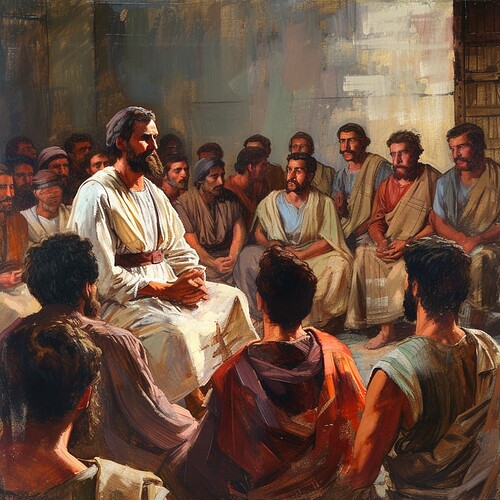![]() February 27: 1 Corinthians 11: Distinction, decorum and The Lord’s Supper
February 27: 1 Corinthians 11: Distinction, decorum and The Lord’s Supper
Unity in Christ and the Reverence of Communion
 Introduction
Introduction
Today, we delve into the wisdom-wealth of 1 Corinthians 11, a chapter replete with pivotal social and spiritual insights. Through it, Apostle Paul prompts us on the importance of acknowledging distinctions, demonstrating respect in worship, and revering the Holy communion.
 Head Coverings and Distinction in Worship
Head Coverings and Distinction in Worship
A key aspect Paul addresses is the decorum in worship, specifically concerning head coverings. He establishes the pertinent hierarchy God → Christ → Man → Woman.
![]() Key Verse: 1 Corinthians 11:11-12 “Nevertheless, in the Lord woman is not independent of man, nor is man independent of woman. For as woman came from man, so also man is born of woman. But everything comes from God.”
Key Verse: 1 Corinthians 11:11-12 “Nevertheless, in the Lord woman is not independent of man, nor is man independent of woman. For as woman came from man, so also man is born of woman. But everything comes from God.”
 The Lord’s Supper
The Lord’s Supper
The latter half of this chapter sees Paul elaborating on the significance and sanctity of ‘The Lord’s Supper’. It is a humbling reminder of the sacrifice of Jesus, a call for self-examination before partaking of this solemn feast.
![]() Key Verse: 1 Corinthians 11:26 “For whenever you eat this bread and drink this cup, you proclaim the Lord’s death until he comes.”
Key Verse: 1 Corinthians 11:26 “For whenever you eat this bread and drink this cup, you proclaim the Lord’s death until he comes.”
 Key Themes and Reflections
Key Themes and Reflections
- The necessity of understanding God-ordained distinction and order, and respect for these in our worshipping practices.
- Respecting the sacredness of The Lord’s Supper, and self-examination as a vital precursor to participating in it.
 Today’s Application
Today’s Application
Within our modern churches, the emphasis on decorum might seem relatively diminished. However, this scripture serves as a reminder that in our worship and actions, acknowledging God’s divine order is essential. The way we observe The Lord’s Supper is likewise significant; it should not simply be a routine, but a solemn re-visitation of Christ’s ultimate sacrifice for us.
 Hidden Gem
Hidden Gem
Interestingly, Apostle Paul’s discourse on the Lord’s Supper in this chapter is the earliest recorded instructions about it, predating even the Gospels!
 Reflective Q&A:
Reflective Q&A:
![]() Why does decorum in worship practices matter?
Why does decorum in worship practices matter?
A: To uphold respect for God amidst His followers and to reflect understanding of God’s ordained order in creation.
![]() What is the deeper significance of The Lord’s Supper?
What is the deeper significance of The Lord’s Supper?
A: It is not just a meal, but a sacred time of reflection and remembrance of Christ’s sacrifice for humanity.
 Join the Discussion:
Join the Discussion:
How do we uphold the sanctity and significance of The Lord’s Supper in our modern lives? Do share your thoughts and experiences.
![]() See You Tomorrow in 1 Corinthians 12 - The Unity amid Variety in Spiritual Gifts!
See You Tomorrow in 1 Corinthians 12 - The Unity amid Variety in Spiritual Gifts!
Reflect and ponder as we embrace these teachings in our hearts, and may we continue growing in the Light and Wisdom of God’s word. Let’s strive to make every worshipful act befitting of God’s glory.
